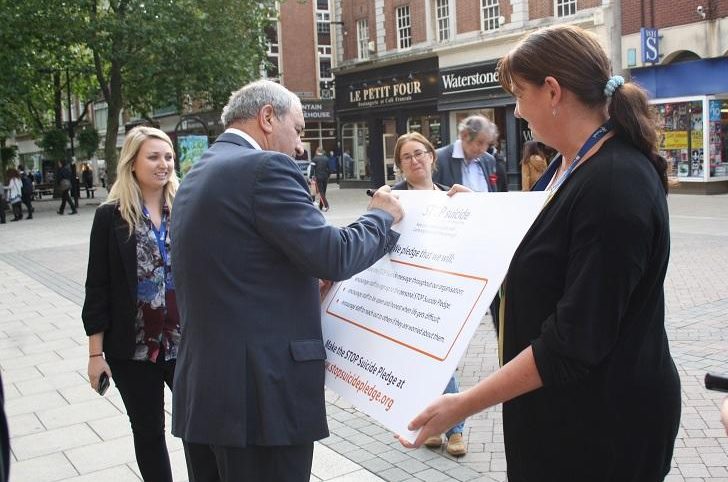To mark World Mental Health Day on 10 October 2014, Peterborough City Council Leader Marco Cereste signed the STOP Suicide campaign Organisational Pledge.

Signing the pledge, Left to Right: Annie Jarvis, Peterborough and Fenland Mind; Marco Cereste, Peterborough City Council and Jo McHattie, Peterborough and Fenland Mind.
Peterborough City Council Leader Marco Cereste has signed the STOP Suicide campaign Organisational Pledge and residents and shoppers were also urged to sign-up as part of a programme of events to mark World Mental Health Day in Queensgate, Peterborough on 10 October 2014.
The aim of the pledge is to raise awareness of the warning signs of suicidal behaviour, challenge the stigma and myths surrounding it and encourage people who may be struggling to seek help and encourage others to do the same.
The pledge is part of the STOP Suicide campaign across Cambridgeshire and Peterborough, which aims to encourage people to be more aware and open about suicide and reach out to those who may be distressed and in need of support.
The campaign is being led by Mind in Cambridgeshire, Peterborough and Fenland Mind and Lifecraft and is supported by Peterborough City Council’s public health team and Cambridgeshire and Peterborough Clinical Commissioning Group (CCG). It is one of four different NHS England-funded pilot campaigns across the East of England.
The Organisational Pledge encourages businesses, community groups and schools to promote the messages to their staff and wider communities. The Personal Pledge encourages people to tell someone if they are struggling and need help, to reach out to others who are in distress and listen non-judgementally, and ask directly about suicide if they are worried about someone. For more information and to sign the pledge visit: www.stopsuicidepledge.org/pledge
Councillor Marco Cereste said:
“We are aware and concerned about the number of suicides in our city in the past year and the council, the NHS and other colleagues in the Suicide Prevention Group are working together on finalising a suicide prevention strategy for the county including Peterborough.
Suicide is a very complex and distressing issue for all those concerned but it is often not talked about. We want to encourage people to get involved in the Stop Suicide campaign to find out more about those who may be at risk so we can all do our bit to provide support. With our fast-paced busy lives it is important that we reach out to those who may be struggling and encourage them to get help when they need it.”
Signing the pledge was just one part of a day of events to mark World Mental Health Day which this year had the theme ‘let’s talk about it’. There were lots of activities to get involved in on the day at Queensgate Shopping Centre, including arts and craft sessions and mini Bounce workshops which aim to show people how making small changes in their lives can make a big difference to their health and wellbeing.
The World Health Organisation predicts that depression will be the world’s most disabling condition by 2030. One in five people will experience depression at some point in their lives.

Signing the pledge, Left to Right: Jo McHattie, Pereborough and Fenland Mind; Marco Cereste, Peterborough City Council; Dr Sohrab Panday, Borderline and Peterborough Local Commissioning Group.
Dr Sohrab Panday, mental health lead for Borderline and Peterborough Local Commissioning Group, which is part of the CCG, and chair of the Peterborough Suicide Prevention Group said:
Read more on the Charity Today website.